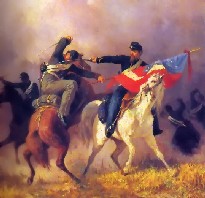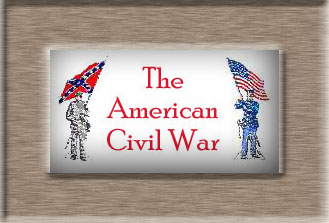


|

The UPPER SOUTH The secession of 1860-61 and the shooting war that followed were the climax of a long interplay. Like a couple heading into divorce, the regions fought often, in the open and in secret. But they nursed grudges, and what they argued out loud was not always the real issue. That the North fought the war as a crusade for the rights of black folks, to free the slaves from their chains, is easily exploded and nobody would seriously maintain it nowadays. However, the modern prevailing view is that the Southern Confederacy was a nation based on, and fighting for, slavery. This view allows no other reason for secession, and thus equates Confederate heritage with racism and slavery. Making out that the Civil War was "about" slavery also has the advantage of being quick, clean, and easy to write. Get a hatful of quotes and you're done. The Confederate leaders and documents supply them in abundance. Taking this position also seems to show an awareness of the slaves' realities, and it adequately reflects the indignation we know we ought to feel at institutionalized human bondage. Economic history, on the other hand, tends to bog down in a turgid tangle of language. And who would want to peel back the easy answers to probe the complexities of the past, when the easy answers feel so good and absolve so much? A small class of bad guys: an aberation in the great American history. Compare the Southern revolt of 1860 to the colonial uprising of 1776. What moved the colonists to break the ties with the "mother country?" Taxes? Tea? George William Brown, mayor of Baltimore in 1861, was a non-partisan politician and an opponent of secession (Lincoln jailed him anyhow). Yet like many people in his day he understood the move, in the light of the American Revolution, and how small points of disagreement can be the flashpoints of broader conflicts:
"The men of '76 did not fight to get rid of the petty tax of three pence a pound on tea, which was the only tax left to quarrel about. They were determined to pay no taxes, large or small, then or thereafter. Whether the tax was lawful or not was a doubtful question, about which there was a wide difference of opinion, but they did not care for that. Nothing would satisfy them but the relinquishment of any claim of right to tax the colonies, and this they could not obtain. They maintained that their rights were violated. They were, moreover, embittered by a long series of disputes with the mother country, and they wanted to be independent and to have a country of their own. They thought they were strong enough to maintain that position."[1] No one can deny the importance of slavery to the feud that split the United States, or that the CSA states made protection of slavery one of their central purposes. But the Southern confederacy -- that is, the national government of the CSA -- was no more built on slavery than was the Northern Union. The Confederate Constitution was pretty much a carbon copy of the U.S. Constitution, except that it stipulated that the government could not impose protective tariffs, grant subsidies, or finance internal improvements. (But then, we are constantly told that the South was "all about slavery," so economic points like that don't matter). On the matter of slavery, it specifically asserted the inviolability of that institution. This was more clear than the U.S. Constitution, but not at odds with it, and Lincoln and many in his camp publicly declared they were willing to amend the U.S. Constitution to make it say the same, if doing so would end the rebellion. Other than that, you can read the two constitutions side by side for long stretches and not be sure which is which. The CSA Constitution banned slave imports from Africa, proscribed international traffic in slaves, kept the three-fifths clause, and even allowed non-slave states the option of joining the new nation. Yet the weakness of the "it was all about slavery" argument seems most apparent when you consider that when the shooting began, four future CSA states, with 1.2 million slaves, remained in the Union. The state with the single largest number of slaves of any state, Virginia, was among them. Together, Virginia, North Carolina, Tennessee, and Arkansas represented half the future CSA's population and resources and held key military installations and armories. If the entire South was going to be a minority force in the government after 1860, consider how much moreso, and how much more vulnerable, the Upper South alone would have been. Yet it was willing to stay, till it saw the course of the Lincoln Administration with regard to force, not to slavery. The secession of the Upper South, when it came, was hardly a bid to protect slave property. Virginia, Tennessee, even North Carolina, with a hostile anti-slavery United States on their frontier, could never hope to maintain slavery as a viable economic and social institution. Their pre-war complaints about fugitives prove they knew it. The mere presence of "free" states nearby in the 1850s exerted an economic pressure that was rapidly draining slavery out of the Border States. National union, with slavery intact, was the only guarantee for slavery's continuance in the Upper South. And if you insist that every slave-holder, or slave-holding state, must make choices solely on the basis of interest in slavery, then I will argue that the Border State that remained in the Union did so to protect their slaves. Why else would slaveholders fight for the Union? As John B. Henderson, the Unionist senator from Missouri, reminded his colleagues, "there are numbers of loyal slaveholders in that state [Missouri], men who have been carrying the flag of their country from the earliest beginning of this rebellion, who have left their homes for the battle-field, leaving their slaves behind them, many of whom are in the service of the country today, and will continue there until the rebellion is over."[2] I think of Basil L. Gildersleeve, Virginia cavalry veteran and professor (author of a Latin textbook I still use for reference), describing his beloved home state's awkward position in the winter of 1860-61:
Submission is slavery, and the bitterest taunt in the vocabulary of those who advocated secession was �submissionist.� But where does submission begin? Who is to mark the point of encroachment? That is a matter which must be decided by the sovereign; and on the theory that the States are sovereign, each State must be the judge. What was different about the situation of Virginia, North Carolina, Tennessee, after April 14, 1861? Was slavery any more threatened after Ft. Sumter than before? Nothing in word or deed, with regard to slavery, had changed in the Lincoln Administration between the months of 1861 when Virginia was in the Union and the day she stepped out of it. How slavery got to be the only acceptable explanation for everything done in the South in the Civil War is a matter of modern historical scholarship going overboard in a horrified attempt to right its old wrongs. I'm convinced future generations will read the tunnel-vision and decide we're all batty. Gildersleeve, in his essay, describes some of his memories of the war. What he writes is typical; only his expression is more elevated than a hundred other testimonies. As he's writing, he has before him "The University Memorial, which records the names and lives of the alumni of the University of Virginia who fell in the Confederate war," some 200 of them.
�[A]nd some of the noblest men who figure in its pages were Union men; and the Memorial of the Virginia Military Institute tells the same story with the same eloquence. The State was imperiled, and parties disappeared; and of the combatants in the field, some of the bravest and the most conspicuous belonged to those whose love of the old Union was warm and strong, to whom the severance of the tie that bound the States together was a personal grief. But even those who prophesied the worst, who predicted a long and bloody struggle and a doubtful result, had no question about the duty of the citizen. ... The most intimate friend I ever had, who fell after heroic services, was known by all our circle to be utterly at variance with the prevalent Southern view of the quarrel, and died upholding a right which was not a right to him except so far as the mandate of his State made it a right; and while he would have preferred to see �the old flag� floating over a united people, he restored the new banner to its place time after time when it had been cut down by shot and shell." The Republicans in the 36th Congress made it clear where the interest lay. Their private correspondence shows them interested in only the appearance of being open to compromise and discussion with the South, for the sake of public opinion. Crittenden's proposal was postponed again and again while the Republicans rushed off to take up the revived Morrill Tariff that had been the promise in exchange for Pennsylvania's votes in 1860, and which was brought up on the second day of the session, despite the secession crisis. The higher duties affected iron, cotton bagging, gunny cloth -- the kind of things that would dip directly into the pockets of Southern planters, big and small. The border state and upper South Congressmen who were risking their careers to keep their states in the union would get no help from that quarter. "Our national property, our citizens, public officers, and rights must be protected in all the States, and our men-of-war must be stationed off the southern ports to collect the revenue."[5] Bingham of Ohio introduced a bill to authorize collection of U.S. customs from the decks of warships. To the Senate naval appropriations bill, introduced Feb. 11, the Republicans added money for seven new steam warships, light, fast, and heavily armed. Everyone knew what that was about. "It must not be forgotten," the New York Times wrote, "that the 'coercion' by which the Federal Government will seek to preserve the integrity of the Union and the supremacy of the Constitution, must be coercion by sea. It must be mainly a matter of blockades." [Feb. 8, 1861]. After much contention, the amendment passed, 27-17. At the same time they were striving to enforce the onerous laws on the South, they were cutting off the beneficial services; the same Congress that was insisting the tariff continue to be paid was voting to authorize the U.S. postmaster general to cut off mail service in the South.
1. George W. Brown, "Baltimore & the Nineteenth of April, 1861," N. Murray, for Johns Hopkins University, 1887, reprinted with an introduction by Kevin Conley Ruffner, Johns Hopkins, 2001.
|
| �2002Douglas Harper | "When misunderstanding serves others as an advantage, one is helpless to make oneself understood." -Lionel Trilling |